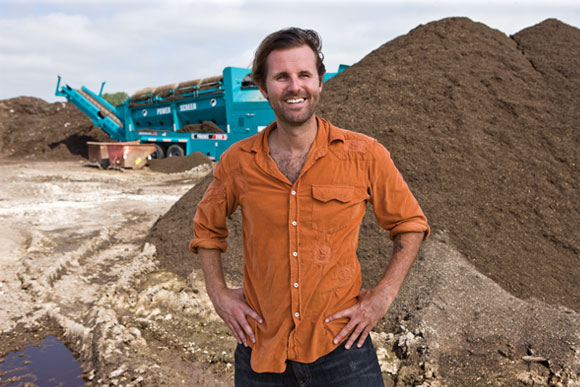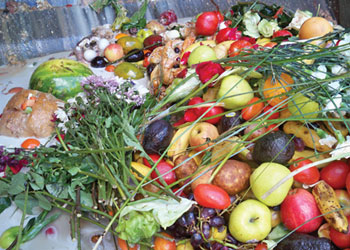by ERICK R. SCHMIDT // Fall 2010

Jerame Gray (B.S. ’08) steps out of the car on a warm July morning, and the sweet, pulpy smell of the compost farm is immediately overpowering. “That’s the smell of progress,” Gray says. The graduate of the Architecture, Urban Planning and Design department visits the Missouri Organic compost site 15 miles north of Kansas City three times a month. It’s difficult to imagine being further from Gray’s original academic focus of architecture, but this is where Gray’s interests in community planning and environmentalism have culminated. Gray’s passion for the planet brings him here, where thousands of feet of hot, steaming waste collected from all over the city and state are being processed into reusable compost.
“If you can take a high percentage of food waste and turn it into earth, why wouldn’t you?” Gray asks. “It only makes sense.” Gray says he’s always enjoyed the outdoors and preferred being out in the sunshine than in an office or classroom. His motivation to make a difference through sustainability began during his first semester at UMKC. As part of a class assignment, he decided to collect and document all of the waste he generated in a week, contained to his one-bedroom apartment.
“A couple days in, I started realizing how much I was consuming, and I started becoming a little more conscious of it,” he says. Not only that, he also began wondering about the bar and restaurant where he worked as a bartender and waiter. He had worked in the food service industry for 10 years but never grasped the amount of waste that was thrown out. From that consciousness came a question: If one person living on his own was creating this much waste in the space where he lived, what was the rest of the world doing to the planet? How was his own job contributing to the dilemma?
“It’s a fast-paced business. It’s an in-and-out business,” Gray says. “People want to come in, they want to get fed, they want to have a good time. As a restaurant, a waiter or a bartender, it’s get them in, get them out. It’s all about making money. In the process, a lot gets left out because everything’s expendable.” It bothered Gray, who says he always felt a connection to nature. “I started thinking there was something I could do or something that could be done that may not be that far out of grasp,” he says. Soon after he graduated, Gray began by looking at the businesses where he worked. He realized the answer was to help the owners and managers learn to adapt their business practices to be more economical and Earth-friendly.

What began as an idea in his apartment soon became Earthscraps, a private consulting firm he founded in early 2009. Gray’s goal is to save landscape and ecology from being turned into landfill. He does so by evaluating a business’s waste, water systems, energy usage and food products. He looks at everything from recycling practices and light bulbs to water flow rate and portion sizes. He then provides his clients with a list of areas where they can improve, including everything from buying supplies from local companies to implementing compost or recycling systems.
He will even train the staff and help them come up with creative solutions. Gray will also point clients toward other resources in the area. For example, Earthscraps works in close partnership with Missouri Organic, the company that owns the landfill site. Within a few hours of consultation and developing a plan, he provides clients with the resources to find a solution that fits them.
“I see myself as being a single point of contact for businesses to get to these services, just a connecting point,” Gray says.To make it work, Gray has to find business owners who are inspired to make a change. He has found those owners at Kansas City establishments Café Europa and The Blue Grotto, both locations where he has worked. He has also worked with Chacko’s Bakery and often takes inquiries from others. Gray says the natural challenge that Earthscraps faces once he finds interested businesses is that he has no tangible product to sell. Instead, he’s selling an idea.
The benefit can be two-fold for owners. “It’s doing the right thing and feeling great about that,” he says. “But it’s also going to save you money.” Like Gray, Molly Davies, associate professor of Geosciences and director of the Environment Studies program at UMKC, has seen an increase in interest for environmental efforts. In seven years, she has seen the number of sustainability and environmental majors offered at the University increase from 35 to more than 150. It’s one of the fastest-growing major areas in the entire University of Missouri System, Davies says.
“People have been doing this for a very long time, but the awareness seems to have reached these generations,” Davies says. “Our student population is varied, too. We’re not just 18-21 year olds, so I can’t just say it’s a younger generation thing.” Davies says that helping to spur the success of the program is its multi-disciplinary nature. Faculty from all across the University participate in the program, including 33 members from the life sciences, business, economics and more. As interest in the program has grown, there has been a need to create or integrate courses with other schools.
One of the most recent additions to the program was a minor in sustainability. The first one was completed this spring. It’s the latest sign that environmentalism at UMKC is growing. Davies says that the difference between the movement being waged now and the one that gained popularity in the 1970s — the one most commonly associated with Earth Day — is that today’s movement has more depth. “It’s moved far away from studying plants and animals and human impacts,” she says. “We are an urban university, and we’re tightly tied to our community. Environment also means the urban environment.”
Students today learn how water, electricity and waste make their way through the city. The impact is being seen not only in Kansas City but also as close as the UMKC campus. When the new Student Union opened this fall, it had the distinction of being completely LEED-certified, a detail that Davies says was pushed by students who wanted to see better building practices used on campus. That awareness has been proliferated by technology and has helped instill willingness for change into the program’s graduates as they move out into Kansas City and beyond. “Kansas City, while not Portland or San Francisco, is rapidly becoming recognized in sustainability,” she says.
Back at the compost site, Gray has his own ideas for the next step in sustainable life in the Kansas City and UMKC communities. He says that there must be more of an effort in legislation and governmental policies for true progress to happen. And Gray says incentives for Kansas City and Missouri businesses to be environmentally responsible, such as tax breaks based on the money a business saves the city and state by cutting down on their waste, are needed. “It’s diverting trash from landfills and giving it to another Kansas City business,” he says. “It’s generating work, creating new products. It’s a no-brainer to me.”
